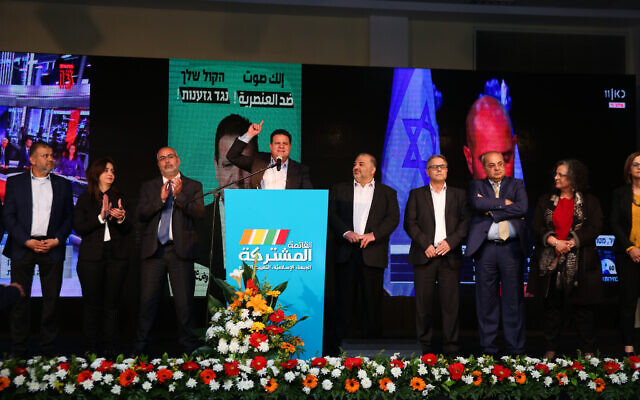After failing to gain widespread support among Arab Israelis, Mohammad Darawsheh’s joint Jewish-Arab Ma’an party dropped out of the race on Tuesday, while urging its supporters to back the Joint List alliance of Arab parties in next week’s election.
“We are not going to recklessly burn thousands of votes for Arab citizens,” Darawsheh told The Times of Israel.
Darawsheh had previously been critical of the Joint List, which he charged had not done enough to improve the lives of ordinary Arab citizens.
In a statement announcing his party’s founding, Darawsheh said Ma’an would “focus only on the social and economic issues that interest the Arab citizen.” Ma’an would seek to move Arab Israelis “from victimhood to decision-making positions,” Darawsheh said.
Darawsheh is a longtime shared society activist who works at Givat Haviva, a center that aims to advance coexistence between Arabs and Jews in Israel. His party ran on a platform emphasizing economic issues, but ultimately failed to make inroads among Arab Israelis.

An electoral billboard by the predominantly Arab Israeli electoral alliance the Joint List depicting Israeli prime minister Benjamin Netanyahu with a caption reading in Arabic “the father of the nation-state law, says ‘a new approach’, whom is he fooling?” is seen above protesters during a demonstration by Arab Israelis in the mostly Arab city of Umm al-Fahm in northern Israel on March 5, 2021, against organised crime and calling upon the Israeli police to stop a wave of intra-communal violence. (AHMAD GHARABLI / AFP)
Most Arab citizens of Israel are divided between the conservative Islamist Ra’am party and the Joint List, a coalition of three mostly Arab parties who run the gamut from liberal Communists to socially conservative Palestinian nationalists.
In a phone call, Darawsheh blamed his party’s inability to break into politics on a 2013 law raising the election threshold. The law, which was sponsored by hawkish Yisrael Beytenu chief Avigdor Liberman, was designed to push the smaller, fragmented Arab parties out of the Knesset.
“It’s very simple — the election threshold is what prevents us from getting a foothold. For Jewish parties, you need 3.25% of the general vote. But Arab society is relatively smaller, so you need closer to 15% of votes among Arabs — five times,” Darawsheh said.
Darawsheh said that internal polling had indicated that if the election threshold was 2% or 2.5%, his party could potentially enter the Knesset.
“The last poll we did, two days ago, showed that 8% of Arab Israelis were willing to vote for us, even though we would not pass the threshold,” Darawhseh claimed.
Arab Israelis are facing one of the most contentious votes in recent memory.
The Arab Joint List, previously an alliance of four parties, saw the conservative Islamist Ra’am faction break away in February.
Ra’am party chief MK Mansour Abbas had pursued a public détente with Prime Minister Benjamin Netanyahu, angering his fellow Joint List parliamentarians. Abbas indicated that he would be willing to cross previously unthinkable red lines — such as sitting in a Netanyahu-led government or voting to provide him with immunity from prosecution.

Members of the Joint List party seen at the joint list party headquarters, in the Arab city of Shfar’am, during the Knesset Elections, on March 2, 2020. (David Cohen/Flash90)
Netanyahu is unpopular among Arab Israelis, who say he has incited racism against them. Many recall the prime minister’s notorious remarks before the 2015 election, in which he said that the Arabs were “going to the polls in droves,” threatening right-wing dominance. Netanyahu later claimed his remarks had been misunderstood.
Due to tension over Ra’am’s increasingly independent push, the Islamist party split from its three coalition partners in early February. Ra’am and the Joint List have fought a bitter campaign against one another, with candidates sniping back and forth in both Arabic and Hebrew media.
While his party was unlikely to pass the election threshold, votes from Darawsheh’s party could tilt the scales for either Ra’am or the Joint List.

Ra’am party chairman and Joint List MK Mansour Abbas at the Knesset in Jerusalem on November 11, 2020. (Hadas Parush/Flash90)
After his announcement that the party would not compete in the upcoming election, Darawsheh called for his party’s supporters to vote for the Joint List.
“Mansour Abbas’s remarks about attempting to influence decision-making [in Israeli politics] is something we can get behind. But his willingness to work with the right-wing parties, his lack of principles or backbone — this is not acceptable. We need dignity, and that is not something we see in Abbas’s discourse,” Darawsheh said.
Darawsheh said Ma’an planned on running again in the next elections. He added that backing Ra’am over the Joint List would have damaged their political future.
“Our votes will come from the Joint List and from those who currently boycott the elections, not from the religious. So allying with right-wing conservatives would not benefit us in the long run,” Darawsheh said.
This article first appeared in The Times of Israel, an Israeli based online newspaper.
 RSS Feed
RSS Feed















 March 17th, 2021
March 17th, 2021  Awake Goy
Awake Goy  Posted in
Posted in  Tags:
Tags: 













